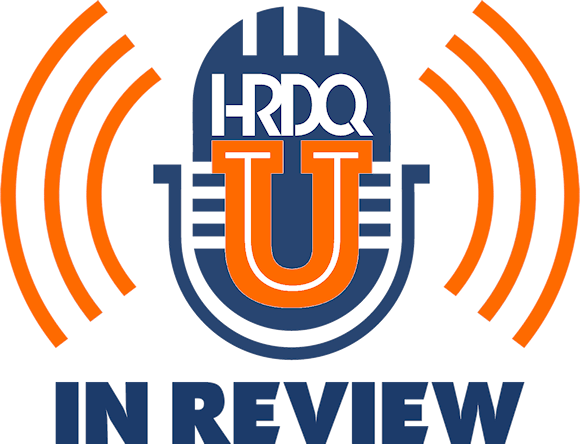
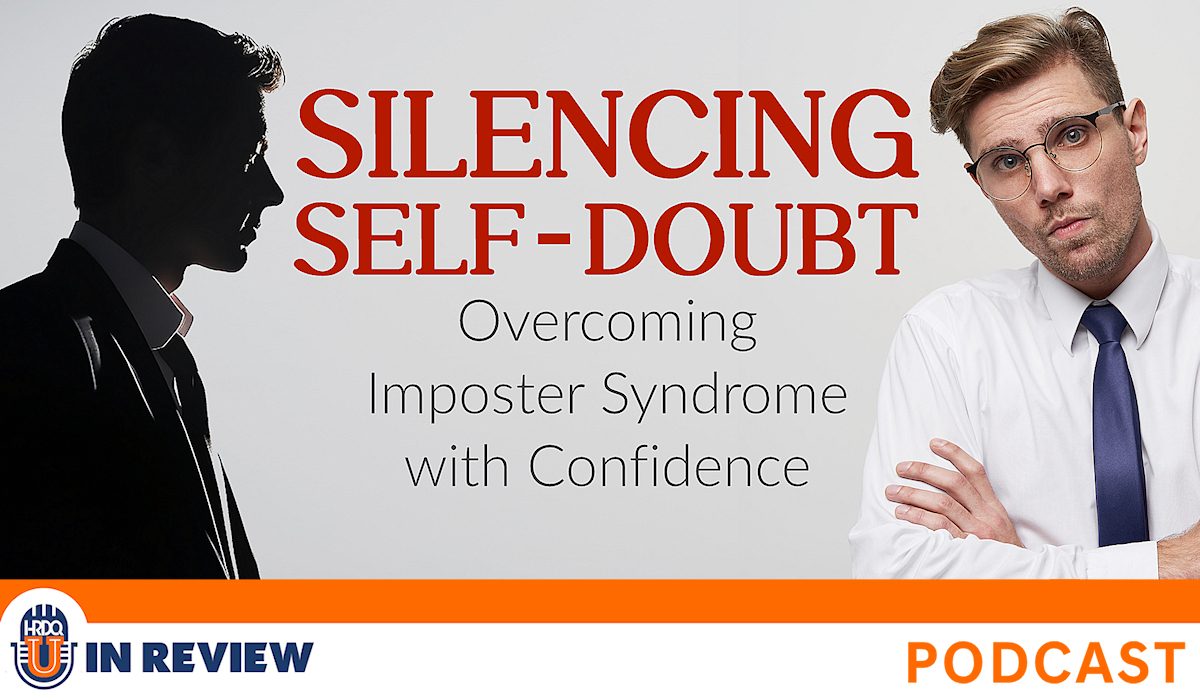
Host Sarah sits down with Patti Massullo, a speaker and trainer specializing in personal and professional development, to explore the realities of imposter syndrome and how to overcome imposter syndrome.
Patti breaks down what imposter syndrome really is – confidence running on outdated software – and shares her own personal stories of self-doubt, including speaking to 650 people at her first engagement and turning down a major opportunity in Washington, D.C.
Together, Sarah and Patti discuss why high achievers are particularly prone to imposter syndrome and provide listeners with actionable strategies to reframe negative thoughts, track progress, build lasting confidence, and overcome imposter syndrome.
This conversation is full of practical tools, from the three-column journaling exercise to the power of mentorship and accountability partners, designed to help you stop questioning your worth and start owning your success.
Chapters
Action Items for Listeners
00:00
Welcome to this week’s episode of the HRDQ-U In Review podcast, where we bring you the latest insights and practical tools for enhancing soft skills training in your organization. This podcast is brought to you by HRDQU.com, and I am your host, Sarah, Learning Events Manager here at HRDQ-U. And today we’re joined by Patti Massullo to discuss the webinar, Silencing Self-Doubt Overcoming Imposter Syndrome. And before we dive in here,
00:25
Be sure to subscribe to our newsletter at HRDQU.com for exclusive updates, upcoming webinars, and resources to help you and your team excel. And also give us a follow and leave us a review on whatever platform you listen to your podcast. It helps us a lot, and we really appreciate your support. Patti, welcome so much. Thanks for joining me today. Thank you, Sarah. Good to be here. Now, Patti, you have joined me here on the podcast in the past. But for our new listeners here, and as a refresher for those tuning in regularly, can you just share a bit about yourself and who you are? Sure.
00:54
Well, I’m a speaker and a trainer. do personal and professional development. I work primarily with schools and companies. And I also have some training and certification in brain health and mental health. So I like to really work with clients on things like what makes people tick. And I’m always fascinated with how we do, how and why we do the things that we do. this topic especially is very near and dear to my heart because I like to be able to conquer.
01:23
conquered it myself for the most part. And so now I like to be able to help other people with it as well. Yeah. And just this week you presented this webinar and had a really fantastic feedback from the audience. So if you’re listening to the podcast and you haven’t checked out the webinar, make sure that you check out the link below so that you can tune into that and give that a listen with all of the great information that Patti shared over there.
01:49
But we are gonna go a little bit deeper into the topic today and talk some more about that. So, Patti, could you share how you define imposter syndrome in simple, practical terms? Sure. Basically, it’s sort of like when you clearly have earned your spot, right? Either through some sort of skill or effort or some result, but you still feel like you’re fooling everybody and that they’re gonna find you out. It’s sort of like your brain, with my brain health training,
02:19
I really discovered that it’s kind of like when your brain refuses to update the opinion of yourself, even when the evidence is piling up in the right direction. So it’s kind of like your confidence running on outdated software. You just don’t believe that you are capable or worthy of doing whatever it is. It can be anything. And you touched on this in the webinar, but could you share a personal experience when you felt like an imposter? Sure.
02:46
Well, I have so many from my past, but the one that stands out the most to me, actually there’s two. The first one is the very first time I ever spoke in front of a large crowd, was, I think it was about 650 people. And I remember feeling like I didn’t deserve it because there were several people that were up for that slot and I got chosen for it. And I remember thinking, I clearly remember thinking, oh, surely they’re gonna change their mind beforehand or regret it afterwards. And of course none of that happened. And then another time.
03:14
This was several years ago, but another time I literally turned down an opportunity in Washington, D.C. because of imposter syndrome. I just felt like, you know, maybe they don’t really know everything about me and they want me, but maybe, and I found different excuses of why I couldn’t do it. I hate to have to admit that, but that was really an eye-opener for me and got me really wanting to delve more into the topic of imposter syndrome.
03:39
And why do you think high achievers are especially vulnerable to imposter syndrome feelings? Well, I think probably because the success feeds into the problem. So what happens with high achievers is they set really high standards because they’re very ambitious, right? But you never feel like you’ve arrived. And what adds to the challenge with that is a lot of companies
04:06
will add fuel to the fire with their ridiculous expectations. it’s like once you reach the goal, they raise the bar again. And then successful people do that to themselves. And when we’re used to success, if we make even a little mistake, it seems catastrophic. And when we work in a really highly competitive arena, we’re always comparing ourselves to the weakest link, it seems like, all the time.
04:31
And could you share what this quote, silencing your inner critic really looks like an action? Sure. It’s not, it’s not anything magical really. It’s, it’s kind of like turning down the volume in your head. You have to catch yourself in the act, so to speak. So for example, if you’re about to give a presentation to your team or whoever you’re going to give it to, and you think, you know, say to yourself, I’m not going to look stupid. You have to respond back to yourself immediately. As soon as you start getting those negative thoughts.
05:01
It’s almost like fact checking your own mental state of mind. And I found that also when you focus on the task rather than the noise in your head, that helps too. And by that I mean, what is it that needs to be done during that meeting? What is it that you have to present? Stop thinking about yourself so much and that noise that clatters up your brain and start thinking about what is it that I need to get done and just go for it. And what are some common patterns or behaviors that signal imposter syndrome?
05:29
Yeah, I think some of the things we touched on too in the webinar was, first of all, over-preparing. Because we think, and this is one that I’ve been guilty of in the past, we think that we don’t know enough, so we have to continually over-prepare. And then of course we downplay our accomplishments. And sometimes we even avoid visibility, like we’ll avoid opportunities that might put us in the quote unquote spotlight. And then we explain away like positive feedback.
05:55
assuming that people are just being nice. That’s why they’re saying that they don’t really mean it. Very common. And could you share one tool or strategy that you found to be most effective in overcoming self doubt? Sure, I talked a little bit on the webinar about journaling, but it’s more than just journaling thoughts. I wanted to, I’m glad you asked this question because I wanted to expound a little bit on what that can look like if somebody is not into like pulling open a journal and just writing down how they feel.
06:26
There’s a little exercise that you can do. And so you have three columns. You have column one, which is the doubt. You want to write down the exact thought that you’re having, whatever it is. Like, I’m not going to be able to do this presentation without stumbling. And then column two is, what is the evidence that supports that? So for example, saying something like, I’ve never led a project like this before. And then column three would be the evidence against it. So list the facts that contradict the doubt.
06:55
So for example, I have led smaller groups before. I was chosen by people who know my work. And so like in brain health, self-doubt operates in the dark. And so this method brings everything into the light. That’s what we like to say, such as, you know, this is a stretch, but I have the skills necessary and I can figure it out. I think this is a good lead in question here for my next one. Can you walk us through an example of reframing a negative thought?
07:25
Sure, so for instance, if you say, I’m not ready for this presentation, I’m going to mess it up. You can reframe that thought by saying, I’m prepared enough to start, and if I hit a rough spot, I can adapt. Every other time I’ve done this, I’ve handled questions just fine, I’ve handled challenges that have come up. And so this keeps the facts in place, and it shifts the focus from the fear of failure to the ability to handle whatever it is that comes up. And you can…
07:53
build on those past wins that you’ve had before, writing those down and reminding yourself that you’ve done it. Maybe on a smaller level, but you’ve done it. So if you say something like, I’m not as good as others, different strengths don’t mean that you have less value. So you bring a unique angle to whatever that team needs. Somebody trusted you to do it. And so just because you feel like you’re not, quote unquote, as good as other people, it’s not about
08:20
whether or not you’re as good, it’s about having different strengths. And sometimes we take those strengths and we compare them. You know, like they’re good at this, so obviously they’re gonna be great at that. When we all have giftings and we all have things that we’re good at. And you mentioned this next question during the webinar. How does knowing you’re not alone help people start to overcome imposter syndrome? Well, first of all, no one wants to feel like they’re the only one, right? We all wanna know that somebody else has experienced that.
08:49
Because what happens is it normalizes the experience, it reduces that shame, and ultimately it builds that sense of belonging. There’s nothing like knowing, oh good, I’m not the only one who suffers from this. And sometimes we can be really surprised with, you know, it can be our superiors, it can be somebody that we look up to that we think, oh, surely they’ve never struggled with this. And that’s why I think it’s really important to be vulnerable, no matter what level you’re at, because people want to know that you’re a real human being.
09:18
And I feel like the world that we live in today, that’s even more important than ever before because people want to deal with authentic, genuine people who are vulnerable and don’t try to put on a facade like they’re perfect. Now beyond mindset shifts, what habits help build lasting confidence? Well, things like sharing with small groups of people.
09:43
I was glad when somebody actually asked this during the webinar and that was like, it helpful to have an accountability partner? It’s extremely helpful to have an accountability partner because that’s somebody that can hold you accountable and you want to make sure that that’s somebody that will hold you accountable for whatever it is you’ve asked them to hold you accountable for. And then of course keeping a record of those accomplishments, whether it’s through a journal or however you choose to keep a record of that. And then constantly seeking support.
10:12
having a mentor, somebody that you look up to that maybe has been there and done that, whatever it is that you’re trying to do, and you respect them. And that person could turn out to be your mentor and your accountability partner. Sometimes those are two different people, but a lot of times they can be the same person. So it depends on the situation and what it is that you’re looking, where you’re looking to build your confidence. Sometimes it’s something specific like, I really need to learn how to be a better presenter.
10:42
Or sometimes it’s something as simple as I need to be able to stand up for myself and ask for a raise or ask for a promotion without feeling intimidated. So everybody’s situation is a little bit different, but you can use all the same strategies no matter what you’re dealing with. And lastly, Patti, where can listeners go to learn more about your work? They can go to my website, either at PattiMassullo.com, or they can find me on LinkedIn. Great. Well, thank you, Patti, so much for your time today.
11:12
Thank you, Sarah. Have a good day. And we hope you enjoy listening to the HRDQ-U In Review podcast, available on all major streaming platforms. And again, if you did enjoy today’s episode, make sure to give us a follow and leave us a five-star review. Thank you all for tuning in to this week’s episode of the HRDQ-U In Review podcast, brought to you by HRDQU.com.

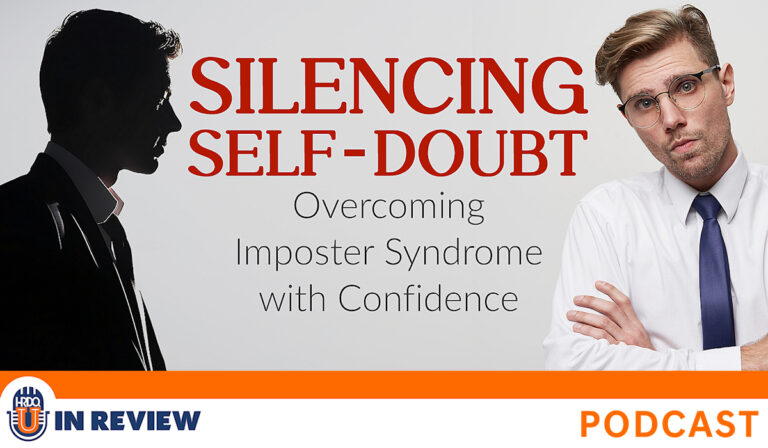
Listen to this podcast event at no charge with your
HRDQ-U Free Access Membership
Host Sarah sits down with Patti Massullo, a speaker and trainer specializing in personal and professional development, to explore the realities of imposter syndrome and how to overcome imposter syndrome.
Patti breaks down what imposter syndrome really is – confidence running on outdated software – and shares her own personal stories of self-doubt, including speaking to 650 people at her first engagement and turning down a major opportunity in Washington, D.C.
Together, Sarah and Patti discuss why high achievers are particularly prone to imposter syndrome and provide listeners with actionable strategies to reframe negative thoughts, track progress, build lasting confidence, and overcome imposter syndrome.
This conversation is full of practical tools, from the three-column journaling exercise to the power of mentorship and accountability partners, designed to help you stop questioning your worth and start owning your success.
Chapters
Action Items for Listeners
[ PODCAST PLAYBACK ]
You must be signed-in with your membership account to access this content.
Enjoyed this podcast? Have suggestions on how we can improve? Please take our quick survey and receive a coupon for 15% OFF any of our individual membership plans.
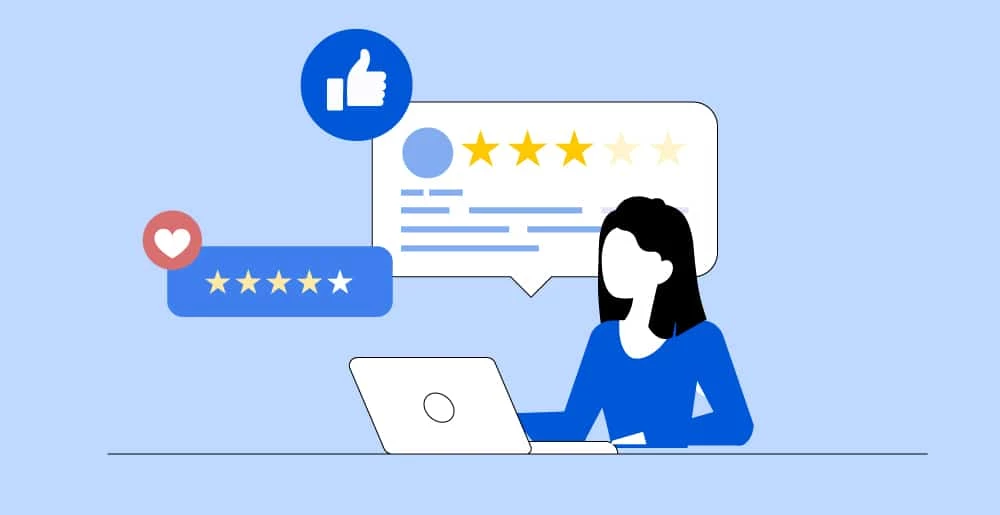
*Instant 15% coupon available upon completion of survey.
Want to learn more? Become an Individual or Corporate member to watch this and hundreds more webinars!
Uncover the hidden roots of imposter syndrome in the workplace and understand why high achievers are especially prone. Learn to shut down your inner critic.

Patti Massullo
Patti Massullo is a certified leadership and professional development coach and Maxwell DISC Trainer. She has been an entrepreneur most of her adult life, owning both online and offline businesses. Patti has mastered the art of communication using proven strategies to help businesses create compelling new ways to connect in every area of their life, both at home and in the workplace. Also certified in mental health and brain health, Patti is passionate about how people are wired and thrives on helping individuals and companies work and play to their strengths.

Training Tools for Developing Great People Skills
This event is sponsored by HRDQ. For over 45 years HRDQ has provided research-based, off-the-shelf soft-skills training resources for classroom, virtual, and online training. From assessments and workshops to experiential hands-on games, HRDQ helps organizations improve performance, increase job satisfaction, and more.

Mental Models Customizable Courseware
Sharpen your thinking with Mental Models – a dynamic training that challenges assumptions, uncovers hidden beliefs, and distinguishes fact from opinion through engaging, hands-on learning.
Buy at HRDQstore.com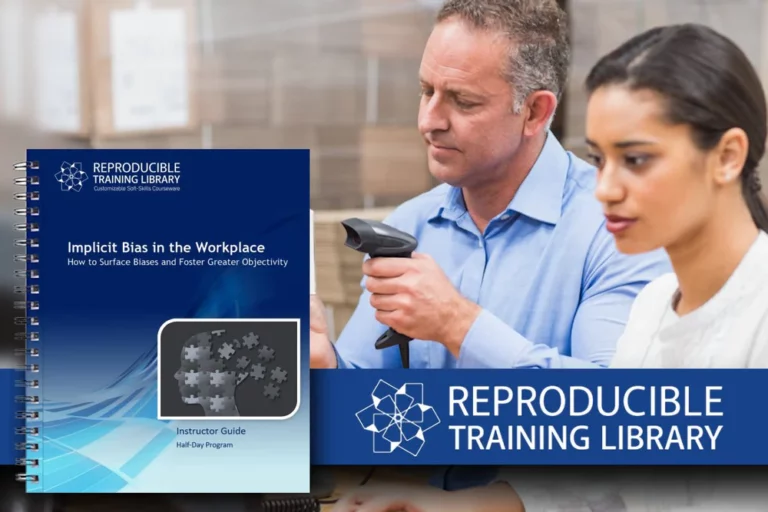
Implicit Bias in the Workplace Customizable Courseware
Uncover how hidden biases shape everyday decisions, and gain practical tools to recognize, address, and reduce them for fairer, more effective leadership.
Buy at HRDQstore.comThe HRDQ-U In Review Podcast, brought to you by HRDQU.com, brings you the latest insights and practical tools for enhancing soft-skills training in your organization. As a learning community for trainers, coaches, consultants, managers, and anyone passionate about performance improvement, we interview subject matter experts and thought leaders from recent webinars they presented with us to take a deeper dive into the content they shared and answer all your questions. Join us as we explore new ideas and industry trends, share success stories, and discuss challenges faced by professionals.
The HRDQ-U In Review Podcast is intended for HR and training professionals, organizational development practitioners, and anyone interested in improving workplace performance and productivity.
New episodes of HRDQ-U In Review are released every week.
The length of the episodes varies, but they typically range from 15-30 minutes.
The podcast covers a wide range of topics related to HR and organizational development, including leadership development, team building, communication skills, conflict resolution, employee engagement, and more.
No, HRDQ-U In Review is completely free to listen to.
You can listen to any available HRDQ-U In Review Podcast right on our website at HRDQU.com via our embedded Spotify player on the related webinar page. In addition to our self-hosted option, you can find the HRDQ-U In Review Podcast on many of the popular streaming services, which are listed above.
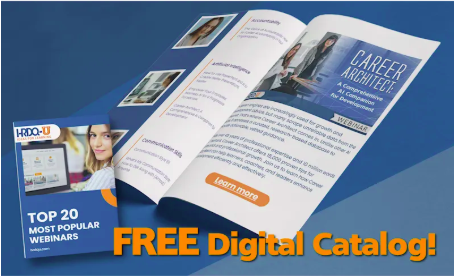
Download our catalog of our top 20 most popular webinars.